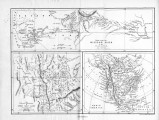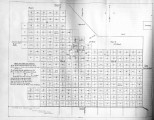| OCR Text |
Show CHAP. I. THE INDIAN TERRITORY. 33 and Ottawas. The west and part of the northeast - poor and barren lands-were retained by 'the aboriginal tribes, Ponkahs, Omahas or Mahas, Pawnees, Ottoes, Kansas or Konzas, and Osages. The central and the remainder of the western portion- wild countries abounding in buffalo-were granted to the Western Pawnees, the Arickarees, Arapahoes, Cheyennes, Kiowas, Co-manches, Utahs, Grosventres, and other nomads. It was somewhat a confusion of races. For instance, the Pawnees form an independent family, to which some authors join, the Arickaree; the Sacs .(Sauk) and Foxes, Winnebagoes, Ottoes, Kaws, Omahas, Cheyennes, Mississippi Dakotahs, and Missouri Dakotahs, belong to the Dakotan family; the Choctaws, Creeks, and Seminoles are Appalachians; the Wyandottes, like the Iroquois, are Hodesaunians; and the Ottawas, Delawares, Shawnees, Potawotomies, Peorians, Mohekuneuks, Kaskaskias, Piankeshaws, Weaws, Miamis, Kickapoos, and the Menomenes, are, like the Ojib-was, Algonquins. The total, number of Indians on the prairies and the Bocky Mountains was estimated roughly at 63,000. Still the resistless tide of emigration swept westward: the federal government was as powerless to stem it as was General Fitz-roy of New South Wales to prevent, in 1852, his subjects flocking to the "gold diggings." Despite all orders, reckless whites would squat upon, and thoughtless reds, bribed by whisky, tobacco, and gunpowder, would sell off the lands. On the 20th of May, 1854, was passed the celebrated " Kansas-Nebraska Bill," an act converting the greater portion of the " Indian Territory," and all the " Northwestern Territory," into two new territories-Kansas, north of the 37th parallel, and Nebraska, north of the 40th. In the passage of this bill, the celebrated " Missouri Compromise" of 1828, prohibiting negro slavery north of 36° 30', was repealed, under the presidency of General Pierce.* It provided that the * The "Missouri Compromise" is an important event in Anglo-American history ; it must be regarded as the great parent of the jangles and heart-burnings which have disunited the United States. The great Jefferson prophesied in these words: "the Missouri question is a breaker on which we lose the Missouri country by revolt, and what more God only knows. From the battle of Bunker's Hill to the treaty of Paris, we never had so ominous a question." The origin of the trouble was this. In 1817 the eastern half of the Mississippi Territory became the Territory of Alabama, and-in those days events had wings- the 14th of Dec., 1819, witnessed the birth of Alabama as a free sovereign and independent slave state. The South, strong in wealth and numbers, thereupon moved toward legalizing slavery in the newly-acquired Territory of Missouri, and when Missouri claimed to be admitted as a state, demanded that it should be admitted as a slave state. The Free-soilers, or opposite party, urged two reasons why Missouri should be a free state. Firstly, since the date of the union eight new states had been admitted, four slave and four free. Alabama, the last, was a slave state, therefore it was the turn for a free state. Secondly-and here was the rub-that '|slav-ery ought not to be permitted in any state or territory where it could be prohibited." This very broad principle involved, it is manifest, the ruin of the slave-ocracy. From the days of Mr. Washington to those of Mr. Lincoln, the northern or labor states have ever aimed at the ultimate abolition of servitude by means of non-extension. c |



















































































































































































































































































































































































































































































































































































































